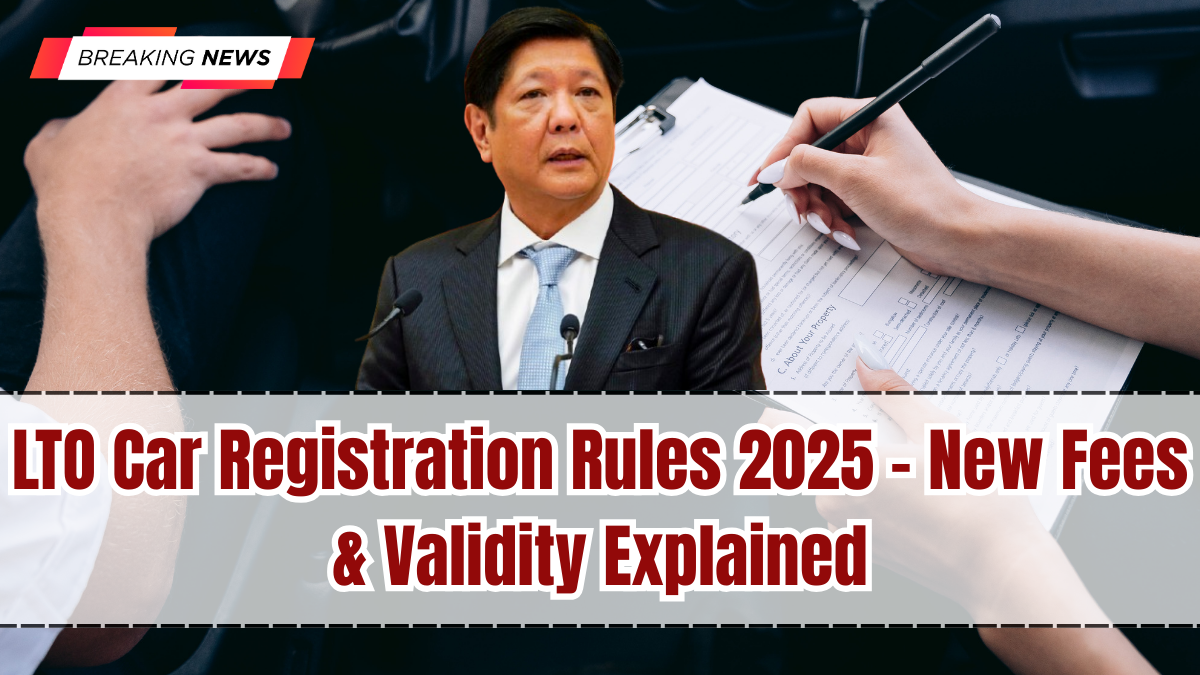The Land Transportation Office (LTO) in the Philippines has rolled out new rules for car registration in 2025, aiming to modernize the system and improve compliance.
Over the years, outdated procedures, backlogs, and inconsistent penalties created frustration for motorists. The 2025 update addresses these issues by simplifying registration steps, revising fees, and clarifying validity periods. For drivers, these changes are not optional—they affect every vehicle owner in the country.

What Are the Key Changes Introduced This Year?
The LTO New Rules 2025 bring in several major updates:
-
Revised Fees: Registration charges have been adjusted to reflect inflation and road maintenance costs.
-
New Validity Periods: Vehicle registration validity now depends on the type and age of the vehicle.
-
Digital System Rollout: More processes are now digitized, reducing the need for long queues at LTO offices.
-
Stricter Penalties: Failure to renew on time will now lead to higher fines and even possible suspension of driving privileges.
How Much Are the New Car Registration Fees in 2025?
The LTO has adjusted its registration fees slightly higher this year:
-
Private Cars (New): ₱1,600–₱1,800 depending on engine displacement.
-
Motorcycles: ₱1,000–₱1,200 depending on engine size.
-
Trucks and Commercial Vehicles: ₱2,000–₱3,000 depending on weight class.
Additional charges like inspection, emission testing, and sticker fees apply. While the increases may seem small individually, they add up for families with multiple vehicles.
How Long Is Vehicle Registration Valid Now?
Under the 2025 rules, validity has been clarified to prevent confusion.
-
Brand-New Cars: Valid for three years upon initial registration.
-
Motorcycles: Valid for two years upon initial registration.
-
Renewals (Cars): Annual renewal required after the initial three-year period.
-
Renewals (Motorcycles): Annual renewal required after two years.
This system ensures new vehicles get a longer initial buffer, while older vehicles undergo yearly checks for safety and compliance.
What Happens If You Miss the Renewal Deadline?
The LTO has tightened enforcement against late renewals.
-
Late Fee Penalty: Additional ₱100 per week of delay, capped at ₱5,000.
-
Expired Registration (over 3 months): Subject to heavier fines and vehicle impoundment.
-
Traffic Violations: Driving with expired registration may also add demerit points to your license.
The new rules aim to discourage procrastination and ensure safer, properly maintained vehicles on the road.
Can You Renew Registration Online in 2025?
Yes. The LTO has expanded its Land Transportation Management System (LTMS), allowing car owners to complete renewals online.
Through the LTMS portal, motorists can:
-
File renewal applications.
-
Pay fees digitally.
-
Schedule vehicle inspection appointments.
-
Download electronic OR/CR (official receipt/certificate of registration).
This upgrade reduces in-person visits, cutting down waiting times significantly.
How Are Emission Tests and Inspections Handled Now?
Emission testing remains mandatory, but the process has been streamlined.
-
Private Testing Centers: Certified centers handle emission checks and upload results directly to LTO’s digital system.
-
Roadworthiness Inspections: Some categories of vehicles, especially commercial fleets, require additional checks to ensure safety.
The LTO is also piloting AI-based vehicle inspection systems that automate testing to reduce human error and fraud.
What Do These Changes Mean for Car Buyers?
For new buyers, the good news is that initial registration validity has been extended. A brand-new car is now covered for three years, meaning no renewals until 2028 for vehicles purchased in 2025.
However, the slightly higher fees mean buyers must factor in total ownership costs, including future renewals, insurance, and road tax.
How Do Businesses and Fleet Owners React?
Fleet operators, such as logistics and transport companies, face higher registration costs due to multiple vehicles. But they welcome the digital system, which makes bulk processing faster and more transparent.
The LTO has also introduced discounts for fleet renewals, encouraging businesses to register and renew on time.
Are Stricter Penalties Fair?
While some drivers feel the penalties are harsh, the government argues they are necessary to enforce compliance. Expired registrations contribute to unsafe vehicles on the road, leading to accidents and pollution.
By imposing heavier fines, the LTO hopes to push drivers toward timely renewals and better road discipline.
What’s Next for Vehicle Registration in the Philippines?
Looking ahead, the LTO plans to expand its digital system further. By 2026, full integration with insurance providers, emission testing centers, and traffic enforcement agencies is expected.
This means that a single online portal could soon handle everything—registration, insurance, inspections, and even penalty payments.
Conclusion
The LTO Car Registration Rules 2025 bring higher fees, longer validity for new vehicles, and stricter penalties for non-compliance. While the updates mean added costs for some, they also promise a more modern, efficient, and transparent registration system.
For motorists, the key takeaway is clear: register on time, use the digital portal, and stay informed about future rule changes. The updated system may seem tougher, but it ultimately makes Philippine roads safer and vehicle ownership more organized.
FAQs
How much is the new LTO registration fee for cars in 2025?
Private cars now cost between ₱1,600 and ₱1,800, depending on engine size.
How long is the validity of new car registration?
Brand-new cars now enjoy three years of validity, while motorcycles get two years before renewal is needed.
Can I renew my vehicle registration online?
Yes. Through the LTMS portal, renewals, payments, and inspection bookings can all be done digitally.
What happens if I don’t renew on time?
You’ll pay a ₱100 weekly penalty, and after 3 months of expiry, your car may even be impounded.
Why did the LTO raise fees this year?
The adjustments account for inflation, road maintenance funding, and stricter enforcement of road safety standards.
Click here to know more.
